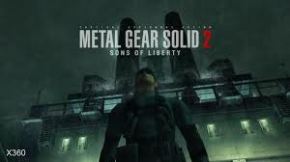by Marcus Brown
Sometimes, the hardest thing one has to think about is what exactly is important enough to pass on to the children of tomorrow. After all, everyone has different morals and values depending on how they were raised, what they’ve learned from life experiences, and so forth. How much is too much? Many would hope that this is their decision to make, and Kojima makes this perfectly clear in his title Metal Gear Solid 2: Sons of Liberty.
On October 26th, 2000, the Playstation 2 console was released in North America. This  console would go on to be one of the top selling consoles of all time. The power of this system brought even more new opportunities to Konami and Kojima Productions, leading to the development and release of Sons of Liberty in 2001. Much smoother polygons, additions to gameplay and a larger story gave fans of MGS another taste of the complex life of Solid Snake. More on the main story can be found here and here.
console would go on to be one of the top selling consoles of all time. The power of this system brought even more new opportunities to Konami and Kojima Productions, leading to the development and release of Sons of Liberty in 2001. Much smoother polygons, additions to gameplay and a larger story gave fans of MGS another taste of the complex life of Solid Snake. More on the main story can be found here and here.
Or rather, the small glimpse of Snake’s life, and the introduction of a whole new character, Raiden. Though many fans were confused as to why they weren’t playi ng as the familiar mercenary. However, use of a new person in the scheme of the story adds to the idea of Kojima’s main theme of this game: the idea of memes.
ng as the familiar mercenary. However, use of a new person in the scheme of the story adds to the idea of Kojima’s main theme of this game: the idea of memes.
The dictionary defines a meme as a certain behavior that is passed on to the next generation. In other words, a meme is part of a culture that gets taught. Nowadays, the word “meme” is used to describe those Internet posts with funny faces and truer statements, but the idea is much older. The concept is also much more relevant. Humans decide what kind of behaviors they want to pass on to their children.
In Sons of Liberty, the player encounters forces that wish to limit what information is released and passed along to the public. While this may sound like a breach of the First Amendment on the surface, the motives for doing so are, in a twisted way, for the good of the public, at least according to one of the antagonists of the game. With the way information is released on a daily basis, it could be feared that the public cannot properly digest this information and could get lost. The motives of the enemy are to limit this flow of information for the public’s protection. Two questions arise from this action.
First of all, as mentioned before, memes and culture are what make society what it is. In the discussion of nature vs. nuture, this game covers how we’re raised and what effect that has on the present and the future. Kojima does take a stance of nuture over nature, judging by character statements in the previous game stating that though our genetic makeup might be a certain way, it does not define us. In this game, different scenes introduce the player to the social importance of leaving behind something that the future generation can follow. What exactly is that? Perhaps that is up to each person to decide. After all, any value of something is in the eye of the beholder. Also, different cultures are, in fact, different due to the perceived importance of certain core values. This is true for social behavior, religion and so many other facts.
Secondly, in regards to the notion of information control, one could field the question of how much information is too much. Or rather, is the freedom of speech an opportunity for everyone to express themselves, or is it a weapon used for over-curious people? Both sides of the argument are shown in the game, by antagonists for the whole argument. One enemy, the Patriots (an appropriate name for this enemy), believes that the public is overwhelmed by freedom of speech and that they don’t deserve the right to freely think for themselves. Another enemy, Solidus (a clone brother of Solid Snake), believes in the freedom of everyone and is willing to go to extremes to release the Patriots’ hold on the country. Both sides of the conversation have both valid points and flaws.
Leading into Solidus’ role as a “son of liberty”, the question of the true meaning of patriot arises. If a patriot is one who loves their country, then how far is too far for someone to go in order to preserve liberty? This shows that Kojima creates characters which can be ambiguous in the players’ perceptions of right and wrong. Solidus really wanted to free the country, though the entire game has the player believing that he is a terrorist like any other. Characters like this are what help give the Metal Gear franchise its depth and dimension.
Metal Gear Solid 2 was one of the first games for the PS2, and it set the bar for high-quality experiences for gamers. What is more important is the questions it brings up concerning the future. Hideo Kojima always calls the question of the future and man’s responsibility to it in his games, but his strongest argument is shown in this game. What are you going to pass on?
Links Used:
http://www.1up.com/news/day-history-playstation-2-born
http://metalgear.wikia.com/wiki/Metal_Gear_Solid_2:_Sons_of_Liberty
http://voices.yahoo.com/internet-dictionary-meme-10843359.html

